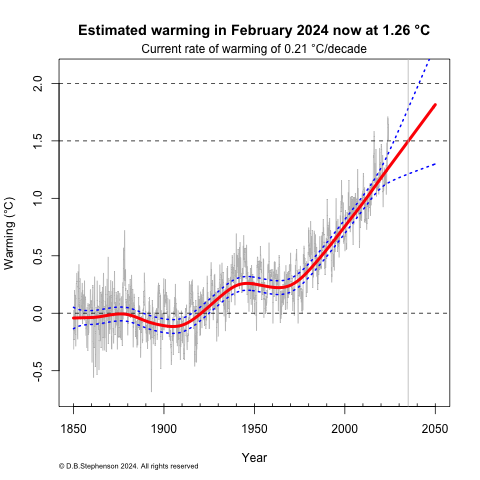How close are we to 1.5 degrees global mean warming?
The figure below shows monthly global mean temperatures (grey line) relative to the 1850-1900 pre-industrial mean together with a carefully constructed robust trend estimate (in red). The title gives the most recent estimate of global mean warming (the rightmost point on the trend curve) and the most recent mean warming rate (the rightmost slope of the trend curve). The dashed blue lines show the 95% confidence intervals on the trend estimate:

How I made this plot ...
- I downloaded the most recent HadCRUT monthly mean global mean temperature data set from http://www.metoffice.gov.uk/hadobs/hadcrut5 at the Met Office
- I read the data into a data frame object in the R programming language
- I calculated the time mean over 1850-1900 and subtracted it from all the monthly values to make anomaly values
- I plotted the anomaly values (the grey line)
- I estimated a long-term trend (the red line) and the 95% confidence interval (the blue lines) by modelling the anomaly values as the sum of a smooth function of year (the trend), a smooth function of calendar month, and an irregular AR(2) noise term having month-to-month persistence. This generalised additive model was proposed by myself and Simon Wood and demonstrated in Box 2.2 (pages 179-180) of Chapter 2 of the IPCC 5th assessment report (2017).
The HadCRUT5 data were obtained from http://www.metoffice.gov.uk/hadobs/hadcrut5 and are © British Crown Copyright, Met Office, provided under an Open Government License. A description of how the dataset was made can be found here: Morice, C.P., J.J. Kennedy, N.A. Rayner, J.P. Winn, E. Hogan, R.E. Killick, R.J.H. Dunn, T.J. Osborn, P.D. Jones and I.R. Simpson An updated assessment of near-surface temperature change from 1850: the HadCRUT5 dataset. Journal of Geophysical Research (Atmospheres) doi:10.1029/2019JD032361
Sources of Uncertainty
Note that estimates of global mean warming differ slightly depending on various choices such as:- which global temperature data set to use (there are several)
- which period to use for the preindustrial mean e.g. 1850-1900
- which statistical model to use for the trend process
- what parameter values to use in the trend model
If you'd like to know more about any of this then please email me.
© D.B. Stephenson (2024). All rights reserved.